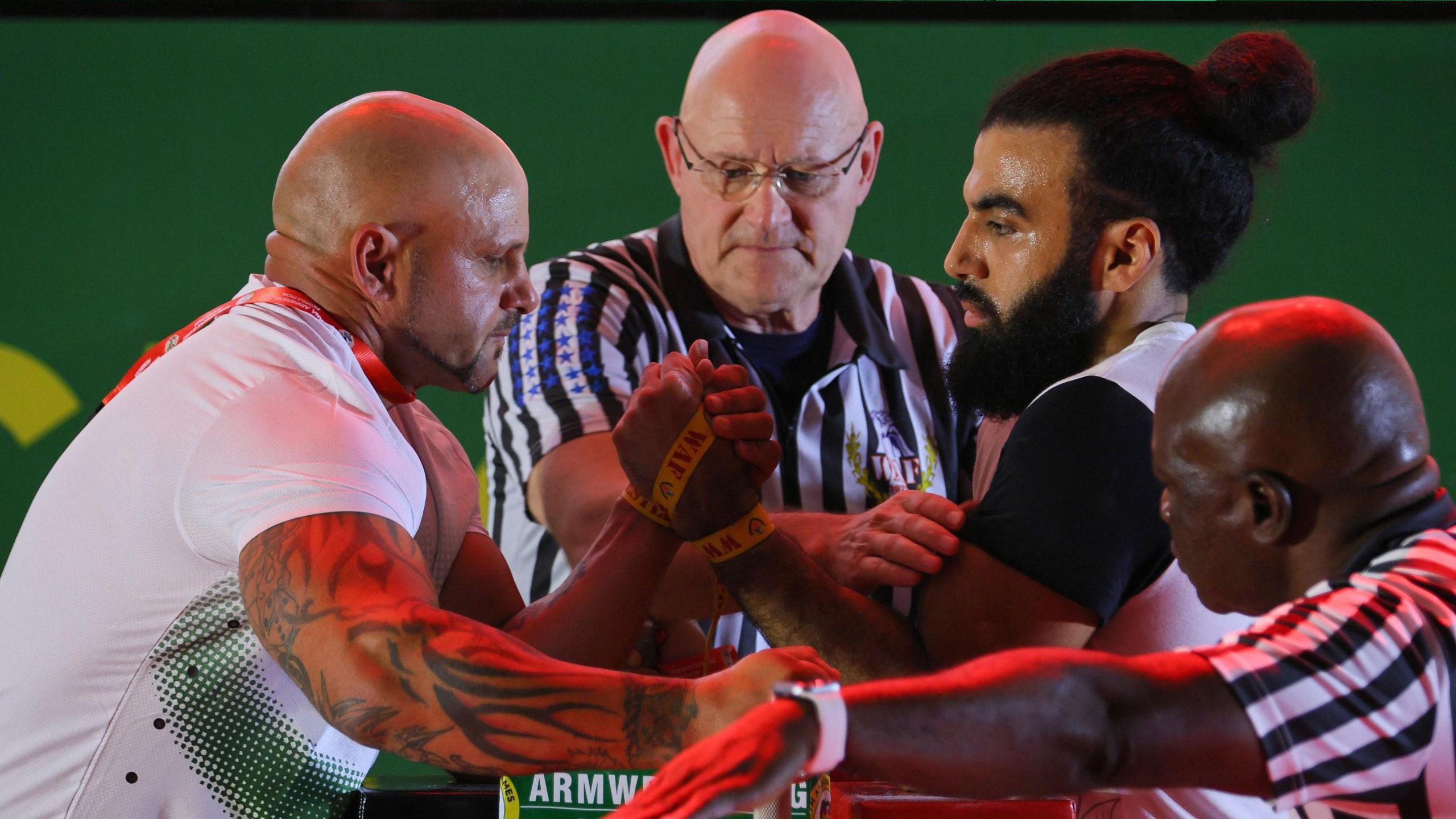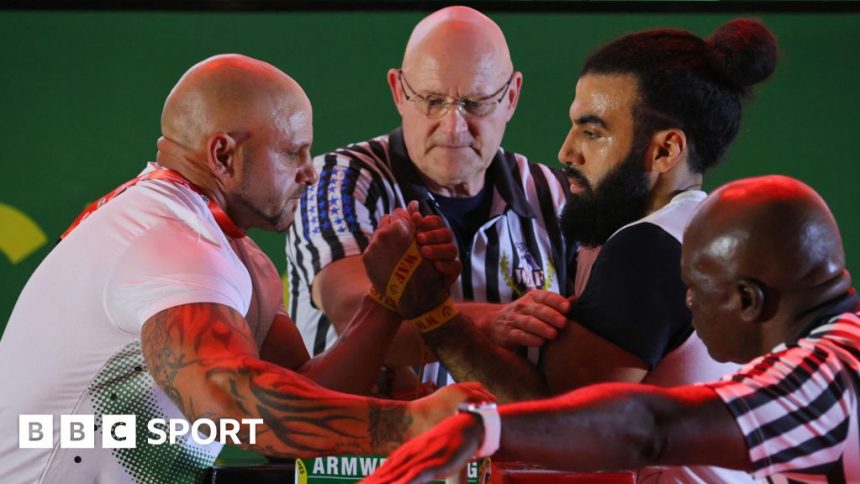‘You don’t have to be the strongest’ – is arm wrestling on the rise?

Arm wrestling made its debut at the African Games in Ghana earlier this year
-
Published
For most people arm wrestling is just a way to show off your strength at school or in a bar rather than being seen as a competitive sport.
Yet, according to the Ultimate Armwrestling League, the discipline has a history dating back more than 4,000 years.
This year, the sport made its debut at the African Games, with a total of 28 gold medals dished out at the continental showpiece held in Accra, Ghana.
Experts say concentration and skill count more than brawn during a showdown at the table.
“You don’t have to be the strongest to be the best,” Rosemary Botha, president of the South African Armwrestling Federation (SAAF), told BBC Sport Africa.
“It is about knowing what to do with what you have.
“You could take someone who lifts weights that would make most of us cry, but put him against one of our arm wrestlers who is maybe 100 kilograms lighter and that guy will beat him based on the fact that he has more technique.
“It’s about using all your muscles at the same time and going in directions which may be unnatural.”
Botha took the sport up seriously in 2007 and has become a maternal figure in South African arm wrestling, mentoring others through the Supernova Club based at her home in Springs, Gauteng.
“I was terrible when I started but I just loved that camaraderie, that opportunity to try and be better than the next person,” she said.
“I arm-wrestled against body builders who had these big muscles. I was this not-so-conditioned little fat girl. I actually was able to stop them.
“I realised that if I actually put some effort in I might be able to also beat them.”
Botha became a multiple national champion and represented her country at the World Armwrestling Championship. Now she is channelling her efforts into growing the sport.
Tapping into ‘raw talent’
Nigerian arm wrestler Mausi Zannu (left) believes the sport will eventually be included in the Olympic Games
Botha believes inroads need to be made in previously disadvantaged communities, including in schools and townships.
“We are not tapping into the raw talent in South Africa,” she explained.
“Some of our strongest arm wrestlers come from farming communities in the middle of nowhere. They come to the table and they are killing it because they just have natural raw talent because of the type of lifestyle that they’re leading.
“They’re living off meat, farming and carrying things around all day and that just makes them so much stronger.”
Botha’s dream as SAAF president is to grow the sport in schools, giving each one a table to allow kids to practise and unearth athletes who could one day win medals.
“I work in a high school and we have got a few boys that are amazing arm wrestlers,” she said.
Nigerian arm wrestler Mausi Zannu, who won gold at the African Games this year, has called for increased levels of funding as she believes the sport is destined to enter the mainstream.
“I believe arm wrestling is going to be in the Olympics,” she told BBC Sport Africa.
“We need support for the sport to go further. In the next few years, arm wrestling should be recognised across the world.”
Female empowerment and breaking stereotypes
With its low-cost nature and ability to be promoted among people with disabilities, arm wrestling also has the potential to boost inclusion – especially for women who might not normally get such opportunities.
“I promote it as a feminine sport, not just a sport to show off your testosterone and ego,” Botha said.
“It’s about how you can empower yourself as a woman as well. You don’t have to be strong. You just have to take a chance at the table.”
One athlete whom Botha has helped develop is 14-year-old Meri Prinsloo, who won a bronze medal in the women’s over 80kg left-arm category at the African Games – despite having only taken up arm wrestling last year.
Botha knew Prinsloo had natural talent from their very first meeting, as she struggled to beat the schoolgirl.
“She came to a practice event and the first time I pulled against her I went down so fast it was not funny,” Botha recalled.
“I realised I would have to use all the technique in the book. I barely beat her that day.”
South Africa’s Meri Prinsloo has shown potential by winning a medal at the African Games aged 14
Prinsloo’s path to a continental medal was not straightforward as her mother Melinda initially opposed her participation, believing that the sport was not suited to young girls and preferring Meri to take up athletics instead.
“I really didn’t think arm wrestling suited her, but how wrong I was,” Melinda told BBC Sport Africa.
“I was surprised to see how many girls and women do arm wrestling. From there on, I realised you shouldn’t say a certain sport is just for a certain gender.”
Meri Prinsloo represents the next generation of arm wrestlers and is adamant that the discipline is not a bar sport.
“You may be drunk for bar sports,” the teenager told BBC Sport Africa.
“In arm wrestling, you go to the table, you’re an athlete and know what you are doing. Technique is important because you have top rollers, hookers and just people who press.
“For me, the top roll is the best.”
The top roll which Prinsloo prefers involves making her opponent open their fingers and hands in order to gain a leverage advantage.
With a bronze from the African Games and a long career ahead of her, Prinsloo could perhaps one day replace Botha as the matriarch of South African arm wrestling.
Hosts Ghana won the most arm wrestling medals at the African Games – with 41 in total – but Egypt took home 14 gold medals to better the West African nation’s tally of eight titles






